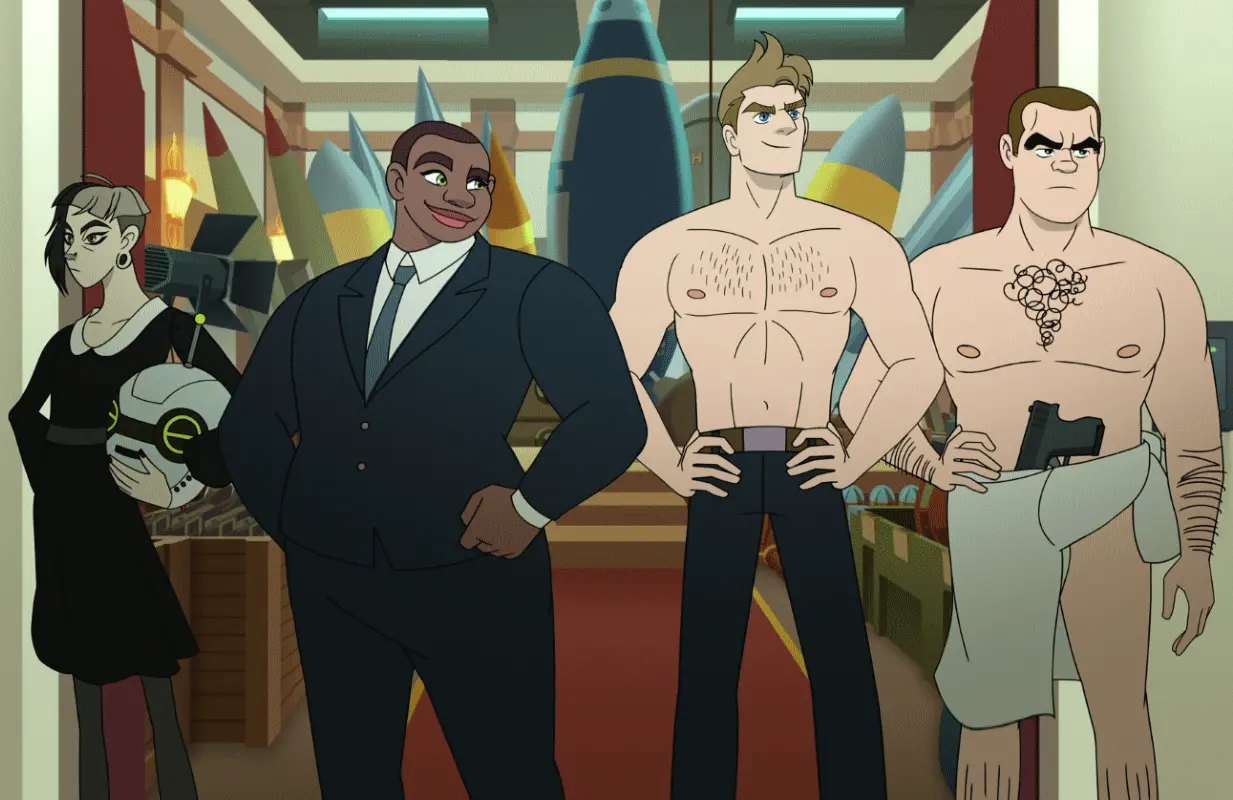Q-Force Is a Queer Archer. (Turns Out We Needed a Queer Archer!)
-
 Photo: Netflix
Photo: NetflixThere's always been something implicitly, if not explicitly, queer about the spy genre. This may seem like an odd thing to say about the genre exemplified by heterosexual avatar James Bond, but at the periphery, something about the elegance of espionage — not to mention the often campy appeal of the quips and the Bond girls and the gin-based cocktails — feels like it's been waiting for a queer interpretation all along. And yet somehow, culture has remained lacking in this arena. A decade ago, the animated series Archer came along with its post-modern comedic sensibilities, and while Sterling Archer's sex-god persona certainly looked like the kind of guy you'd see cruising at your local Equinox gym, that show has remained predominantly heterosexual. Inasmuch as we need any TV show, Netflix's Q-Force fills a spiritual niche that at least this viewer has found wanting in the entertainment sphere: a defiantly queer spy comedy. That Q-Force does this as nimbly and with as much charm as it does is so much the better.
The premise of Q-Force is incredibly simple and laid out in the show's first episode: Sean Hayes voices "American Intelligence Agency" spy Steve Maryweather (just call him "Mary," everyone at work does), a smart, capable, and incredibly hot spy, who was an ascending star in the game until he came out of the closet at his graduation ceremony. Ever since, he's been institutionally sidelined and relegated to the West Hollywood bureau, treading water with his "Q-Force" team of LGBTQ+ spies until one day they manage to crack a case that makes the Agency take them seriously. Only now, they need to take on boorishly heterosexual agent Rick Buck (David Harbour) as a team member.
The Q-Force team itself is where the show derives a great deal of its charm, populated by Deb (Wanda Sykes), the team's mechanic; Twink (Matt Rogers), the team's drag-queen mistress of disguise; Stat (Patti Harrison), the team's misanthropic hacker genius; and V (Laurie Metcalf), the deputy director of the AIA and seemingly the only member of the top brass who believes in them. After a premiere episode that at times feels more than a little clunky as it establishes these characters and lays down the show's queer bona fides, Q-Force settles into itself, finding a confidence that allows it to be screamingly, specifically funny while also establishing genuine chosen-family vibes for its characters.
The series comes from executive producers and creators Hayes and Michael Schur (Parks and Recreation; The Good Place; Brooklyn Nine-Nine), and its showrunner is Gabe Liedman. It's hard not to look at Hayes's presence and leadership on the show and not remark on how far queer TV has come from the days where his portrayal of loudly out Jack on Will & Grace was the cause for so much hand-wringing from straights and gays. There's something cosmically correct about Hayes now getting to voice a gay male protagonist who gets to be not only strong, smart, and capable but also confidently swishy and straightforwardly horny (to its credit, there is … quite a bit of very frankly depicted animated sex in this show). Liedman, meanwhile, has not only written for shows like B99, Pen15, Big Mouth, and Broad City, but has been one of the brightest lights in queer comedy for a decade. (Liedman also voices Benji, Mary's love interest who's completely unaware of all this spy business.)
The charms of Q-Force sneak up on you a little bit. The jokes start out broad and the characters a bit one-note, but what emerges is a show that feels incredibly authentic in its comedic sensibility, even as the plots follow superspies to fictional European republics and through byzantine West Hollywood terrorist plots that get foiled at circuit parties. If you haven't hopped on board by the time Q-Force delivers an episode that references Eurovision, The Princess Diaries, Vox Lux, and Mariah Carey, then sure, Q-Force is not going to be for you. But I also feel bad for you! The agility of a show that feels absurd enough to do riffs on L.A. Confidential, Amy Klobuchar, and corporate sponsorship at Pride needs to be recognized for its charisma, uniqueness, nerve, and talent.
And while all that absurdity could easily spin off into something weightless and shrill, Q-Force grounds itself rather impressively, giving its characters real stakes without robbing them of their essential comedic edge. Deb has a wife at home and a life outside the spy game that she guards ferociously; Mary grapples with having sacrificed his personal life for his job; Stat gets a very unconventional and deeply cool love interest. The familial vibe among the whole team is built episode by episode and ends up feeling quite earned, even if Twink's French-Canadian childhood trauma feels very Batman Forever.
When the Q-Force trailer first emerged, the social media reaction had the air of a community with its guard up, unwilling to trust a show this loudly queer and silly to have anything in the way of intelligence or emotional intuition. I'm here to advise audiences to fight through that defensiveness, fight through the choppy first episode, and be rewarded by a show whose status as a unique and necessary unicorn is trumped by the fact that it is quite simply a TON of fun.
Q-Force premieres September 2nd on Netflix
Joe Reid is the senior writer at Primetimer and co-host of the This Had Oscar Buzz podcast. His work has appeared in Decider, NPR, HuffPost, The Atlantic, Slate, Polygon, Vanity Fair, Vulture, The A.V. Club and more.
TOPICS: Q-Force, Netflix, David Harbour, Gabe Liedman, Laurie Metcalf, Matt Rogers, Michael Schur, Patti Harrison, Sean Hayes, Wanda Sykes